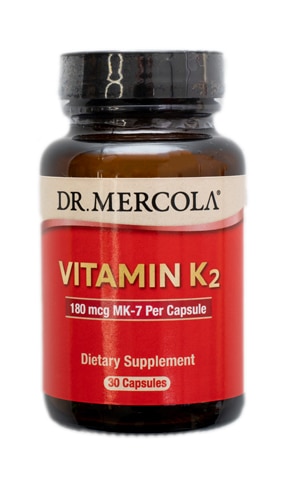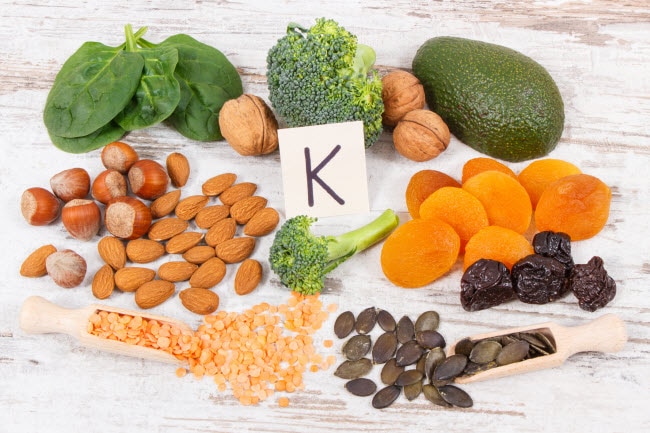Most of us have the basics about vitamins down: vitamin D for bone health, vitamin C for immune support, vitamin B for optimal energy—and that’s just our getting started. Not only do we regularly supplement with these nutrients, but we also actively seek out foods that boast them—a task that’s made all the easier with contemporary health products. (Emergen-C, anyone?)
But one nutrient that isn’t on our radars often enough is vitamin K. Identified in 1929 by Danish scientist Henrik Dam, it quickly earned the moniker of “the coagulation vitamin” due to its blood-clotting power. Spelled “koagulation” in German, where Dam’s first scientific findings were published, it became known as vitamin K—one of the least well-recognized vitamins in the alphabet but one of the most vital.
In the years that followed, Dam and American biochemist Edward Doisy went on to receive the Nobel Prize in Medicine for their discoveries on vitamin K. Chief among them was that there are two naturally-occurring forms: phylloquinone (vitamin K-1) and menaquinones (vitamin K-2); both are central to overall health. Here’s more of what you need to know about this crucial nutrient:
Vitamin K function - what does it do?
As mentioned, vitamin K is best-known for its impact on blood coagulation. This is more important than you may realize. From surgery to a cut to an injection, the ability to coagulate blood inhibits excessive bleeding and aids in the complex process of healing. Research also demonstrates that vitamin K naturally supports cardiovascular health. Furthermore, vitamin K may play an imperative role in the prevention of fractures in post-menopausal women with osteoporosis, thanks to its influence on calcium and bone vitality.†
Indeed, vitamin K2 activates a number of proteins that enable calcium to reach the right places in the body, ushering the mineral into the teeth and bones and away from the arteries and veins (where it’s unwanted and detrimental). As such, more and more research is pointing to the significance of vitamin K for arterial, bone, dental and heart health.†
How much Vitamin K do I need?
The National Institutes of Health reports that women need 122 micrograms of vitamin K1 per day, while men need a touch more at 138 mcg. Sound like a teeny amount? It is—and, fortunately, most people get sufficient amounts of this subtype through a balanced, nutritious diet. Meanwhile, the ideal amounts of vitamin K2 have yet to be definitively determined; however, studies show that 180-200 mcg may be optimal.
What are the signs that I’m not getting enough?
While inadequate vitamin K levels are rather rare—and are generally caused by liver complications, a poor diet, IBS, and the long-term use of antibiotics and blood thinners—the signs that you’re getting enough are difficult to ignore. These include bruising easily, excessive bleeding (from wounds, injections, the gums, and nose), blood in your urine or stool and heavy, painful periods. A less obvious sign is loss in bone density.
What vitamin K foods should I reach for?
The key to achieving solid vitamin K1 levels is to fill your plate with greens. Kale, spinach, broccoli, Brussels sprouts, collard and turnip greens—all brim with excellent amounts of Vitamin K1.
To bolster your intake of vitamin K2, consider adding natto to your grocery list. This Japanese breakfast food, comprised of fermented soybeans, contains 1,100 mcg of vitamin K2 in a 3.5 ounce serving. (Don’t be put off by its stickiness or its distinct smell: It tastes great in salads and sandwiches.) What’s more, natto is rich in probiotics, giving your health (and especially your bones) an even bigger boost.
Other top options include edamame, mozzarella cheese, canned pumpkin, chicken liver, pomegranate juice, pine nuts, eggs and carrot juice. And above all, endeavor to eat whole, organic foods that are cultivated in mineral-rich soil.
Is it possible to have too much vitamin K?
Given that vitamin K functions as a fat-soluble vitamin (and is found in the brain, liver, heart, pancreas, and bones) and is also produced by gut bacteria, it is possible to get too much—but this too is atypical. As Harvard Health writes, vitamin K “is broken down very quickly and excreted in urine or stool. Because of this, it rarely reaches toxic levels in the body even with high intakes, as may sometimes occur with other fat-soluble vitamins.” If it does occur, excessive blood may clot too quickly, which can increase the risk for a heart attack, stroke or blocked blood flow. The Mayo Clinic reports that signs of too much vitamin K can also manifest as a decreased appetite, decreased movement or activity, difficulty breathing, an enlarged liver, general body swelling and muscle stiffness.
Should I take a vitamin K supplement?
Most people will benefit from taking vitamin K2 but as always, inquire with your doctor if it is right for you. If you do start a supplement, go with a non-synthetic version, such as vitamin K supplemnts derived from the aforementioned natto, as it operates as the longest lasting, most bioactive form of vitamin K available. In turn, you may find yourself lasting longer—and feeling stronger in general.†
†These statements have not been approved by the Food and Drug Administration. These products are not intended to diagnose, treat, cure or prevent disease.




